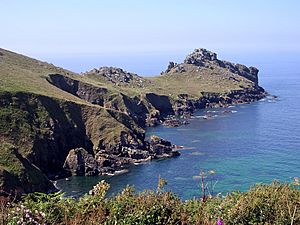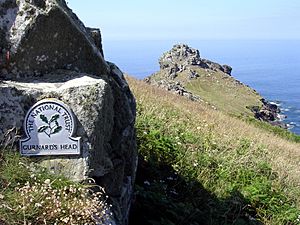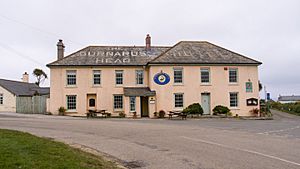Gurnard's Head facts for kids
Gurnard's Head (Cornish: Ynyal, meaning desolate one) is a famous piece of land sticking out into the sea. You can find it on the north coast of the Penwith peninsula in Cornwall, England. People say it got its English name because the rocky shape looks a bit like the head of a gurnard fish!
Contents
Exploring Gurnard's Head
Amazing Rocks and Ancient Volcanoes
Gurnard's Head is home to some really cool rocks called basaltic pillow lavas. These special rocks formed from underwater volcanic eruptions. Imagine hot lava flowing out of a volcano under the sea! This happened about 400 million years ago, making the rocks here incredibly old.
Where is Gurnard's Head?
This headland is located north of a small village called Treen. It's also about one mile west of Zennor Head. Most of Gurnard's Head is looked after by the National Trust, a charity that protects special places.
Protected Natural Beauty
The area around Gurnard's Head is very important for nature. It's part of a special protected zone called the Aire Point to Carrick Du SSSI. SSSI stands for 'Site of Special Scientific Interest', meaning it has important plants, animals, or geology. It's also part of the beautiful Penwith Heritage Coast and the Cornwall Area of Outstanding Natural Beauty.
Walking the Coast Path
The famous 630 miles (1,010 km) South West Coast Path crosses the southern part of the headland. This path is great for hiking and enjoying amazing views of the coast. There's even a pub and hotel on the nearby B3306 coast road that shares the name Gurnard's Head.
History of Gurnard's Head
Ancient Forts and Chapels
Gurnard's Head was once home to an Iron Age promontory fort. This type of fort was built on a headland, using the natural cliffs for defense. It was known as Trereen Dinas.
On the cliff edge, above Treen Cove, you can still see the remains of an old building called Chapel Jane. This might have been a chapel used by local fishermen. The oldest pottery found here dates back to the 1100s. The chapel's simple design is similar to other tiny chapels found on the Isles of Scilly. Some people think it might be even older, possibly from the 700s, because it was near a stream that was thought to be a holy well.
Mining for Copper
To the east of the headland, you can find an old engine house. This building belonged to a copper mine. It was first called Treen Copper Mine, but later its name changed to Gurnard's Head Mine.
Fishing for Pilchards
There are two small coves near Gurnard's Head: Treen Cove and Rose-an-Hale Cove. In the 1870s, fishing for pilchards was a big deal here. The Gurnard's Head seine fishery was very successful, bringing in a lot of money. It employed twenty-four men and used ten boats and two large nets called seines.
The pilchards caught here were sold fresh to local people. Unlike other places, they weren't usually salted and sent to the Mediterranean market. In 1880, the Western Fishing Company, which ran the fishery, closed down. All their equipment, including boats, nets, and buildings, was sold off.
A Popular Spot for Visitors
Gurnard's Head became a popular place for tourists during Queen Victoria's time. The Gurnard's Head Inn, a local hotel, was put up for sale in 1880. It was part of a larger property that included rights to use common land on Treen Cliff and some farmland.
 | Jessica Watkins |
 | Robert Henry Lawrence Jr. |
 | Mae Jemison |
 | Sian Proctor |
 | Guion Bluford |




